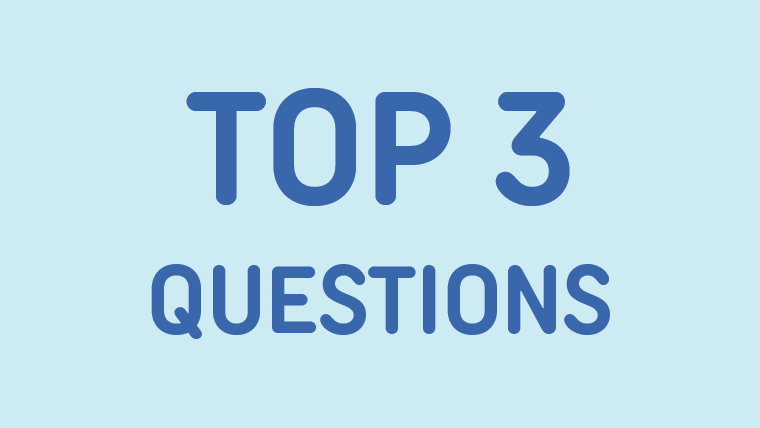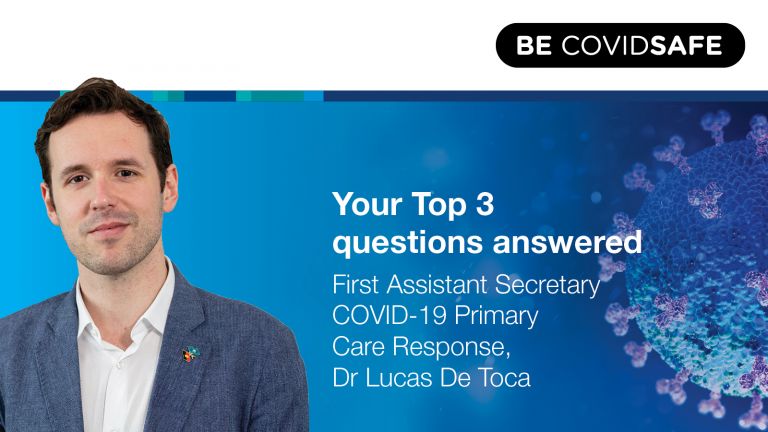
Good morning. I’m Dr Lucas De Toca. Once again, thank you for tuning in to see us answer some of the questions you have been asking on social media channels. Today as always, I’m joined by Linda who is doing the Auslan interpreting. Thank you. Today’s shout out goes for everyone who is going out to get their booster doses. Today we’ve had over 270,000 people receiving third doses, or booster doses since the program commenced which is really exciting. We’re seeing more than 10,000 people everyday coming forward to receive their booster. Everyone in Australia who is 18 years and over – or over and had their second dose of vaccine, six or more months ago is now eligible to go and get a booster from a GP, from a pharmacy, from a state clinic or Commonwealth vaccination clinic or a Aboriginal health service. If you are fully vaccinated, you had your primary course, that’s your first two doses six months or more time ago, you are now eligible to get your booster dose to ensure that you are even more protected and for longer against COVID-19.
One question that it’s quite topical today given what’s going on in Katherine and the surrounding areas is whether warmer places like the Northern Territory are less likely to get COVID or have a lower risk of transmission? The answer really is that, like for many things, there’s a lot of factors and circumstances that add layers to the issue. It’s not a straightforward yes or no. There seems to be some evidence but it’s definitely not conclusive that COVID spread might be somewhat hindered by wet and warm climates. We do see that generally cold and dry climates seem to be correlated with increased transmission of respiratory virus. It’s complex to analyse why this is. In many cases we have seen seasonal peaks for COVID-19 coinciding with winters, especially the northern winters across Europe and the US we have seen marked spikes. It’s hard to ascertain how much is due to the climate or how much of it is due to different waves that have come in or how much of it is actually how climate changes people’s behaviour. If it’s cold people tend to stay inside more and we know that indoors transmission is a much higher or indoors is much higher risk than outdoors. Whereas people in warmer climates can be outside more, which reduces your risk of transmission. So, it’s unclear whether overall a warmer and wetter climate, like what we get in – during monsoon season or wet season in the NT is actually protective. There’s other factors that might also impact, like density, like the number of people living in each household, situation of how dense a community is, that have an impact. What we are seeing that experts are worried that remote communities, for a whole range of conditions, including the number of people that live in every house, might be at greater risk for greater transmission of COVID-19 and that’s why at the moment the response of the Northern Territory government, the local Aboriginal health service and the Commonwealth is putting together to support the greater Katherine region with the cases they have had is really important, even if it is quite hot and humid there at the moment. So, COVID-safe behaviours and vaccination, regardless of what the climate is we will get more data as we live with the virus whether seasonal variations are related to the climate or whether it’s an artifact of other factors.
The other thing that is coming really strongly at the moment is questions on oral therapeutics. We’ve talked before about some of their infusion — some of the infusion type of drugs that can be used to manage COVID. There’s a lot of talk now about oral medication that can be used to alter the course of the disease. So, there are two therapeutics that the Australian government has purchased and has an advanced purchase agreement for, Molnupiravir, which is currently being assessed by the TGA and another oral therapeutic that has been developed by Pfizer, a newer oral drug that is taken in conjunction with another drug. Both of these drugs have to be taken twice a day, early in the disease and for five-days. Both seem, based on the early trials, to have an impact on reducing the chances of hospitalisation, severe disease, bad outcomes from COVID and even onwards transmission in some cases. There’s very positive coming from the Molnupiravir trial that shows potentially severely reduced hospitalisations due to COVID and we are also watching how the early results from the Pfizer’s new drug is also showing, which again it’s promising. Ultimately, the Therapeutic Goods Administration, the TGA, Australia’s drug regulator is reviewing all of these drugs and any other that will come up and we will not introduce Australians — this drug into Australia until a very stringent regulator is satisfied that it’s both effective and safe. However, it is exciting to think that hopefully early next year we may have additional tools in our toolbox to fight COVID. The Molnupiravir, the one produced by Merck has to be taken fairly early on in the disease, preferably five days from onset of symptoms and based on those trials, then it could severely reduce chances of hospitalisation. Ultimately, vaccination which we have available here and now for everyone in Australia 12 years and over is still your best protection but it’s really encouraging to know that even for vaccinated people for which the risk is severely reduced but not completely extinguished we can never extinguish risk. We have a second line of defence, so that if people contract COVID and are at higher risk of progressing through severe disease because they’re older or have underlying conditions we then hopefully if TGA approves have another line of things that we can do to keep people safe from bad effects from the disease. So, exciting times in the pipeline. Hopefully we will see more of this coming through. Both drugs look inhibit implications, so stopping the virus from copying itself. Some of the therapeutics that are being developed at the moment, might actually have application for broader coronaviruses other than SARS COVID which is the one that causes COVID. Maybe this line of research will get us some drugs like against the common cold. At the moment except for treating the symptoms we don’t have anything that gets us faster recovery from a cold. Watch this space. We will keep you updated with any changes from the TGA. We have put purchases on pre-emptively, so if TGA approves we can make sure everyone who needs it in Australia will get access. We will keep you posted as the regulator keeps reviewing these two new drugs.
Finally, which – it’s a broad question but ultimately is what underlines alot of the questions we’re getting in these chats is what are the benefits of COVID-19 vaccination? I mean, I could speak for 1.5 hours about this. I will try to keep it really short to just the basics. The benefit is with a COVID-19 vaccine and full course of COVID-19 vaccine you are reducing your risk of severe disease dramatically, reducing your risk of ending up in hospital or dying from COVID dramatically, but you are also reducing your risk of getting the disease and if you get it transmitting it to others. We’re getting more and more evidence about how these vaccines are providing indirect attention and reducing the chance of transmission between people who have acquired the virus and also reducing the chances of getting the virus altogether. There is plenty of reasons. Direct protection from yourself, indirect protection to people around you and overall protection for the broader society. By which getting these vaccines which is easy, accessible and free available all around the country will provide all the benefits not just to you but to those around you. They have been assessed to provide these benefits and to be safe by the TGA. Their incredible effectiveness and incredible benefits that the vaccines provide, doesn’t mean it doesn’t have side-effects. It is important that we talk about the common side- effects of that, so those risks are not mitigated. Essentially anything we do in life has risks. Any drug that we take has side-effects and every vaccine we take has side-effects. These vaccines because they are so effective and so good at providing protection against severe disease. They do seem to have a decent profile of side-effects and many people do have adverse events or side-effects from the vaccines. Whether it’s a fever or not feeling not great or sore in the injection side, that’s fairly come common. That is okay, that shows that your immune system is reacting to the vaccine. There are very rare side effects that are a little bit more severe. We have talked about the very rare clotting condition with AstraZeneca or a very rare inflammation of the heart with Pfizer and Moderna. These are so rare and orders of magnitude rarer than they’re very real, very common, very bad side- effects that people get from COVID. COVID causes clots. COVID causes inflammation of the heart. COVID can cause long-lasting damage. So, it’s just such a clear sort of risk equation that we have effective, safe, vaccines that both protect yourself and those around you. That it’s probably one of the most effective public health interventions we can even think of. Ultimately talk to your health professional. These are just general videos in which we share public health advice and share views and latest information from the department. When it comes to your health the best thing you can do is to think your circumstances, talk to your health professional, GP, nurse, Aboriginal health practitioner who know you well, understand your health context and have a discussion about whether these vaccines are right for you. Given that over 90% of the population in Australia aged 16 years and over have already received one dose and we are rapidly racing towards over 90% fully vaccinated. Those conversations have already happened for the majority of the country which is great to see. The outcome of those conversations from the immense majority has been to get the vaccine. If you have doubts, if you have questions, that’s completely normal and fine. Talk to your health professional and consider getting the vaccine if you haven’t already. If you’ve had full course, your second dose, more than six months ago, consider getting a booster so that you are even more protected and for longer after your primary course.
That’s all for today. Thank you for listening in. Thank you Linda for your interpreting and we will see you next time.
Top 3 questions
- Are people who live in warmer climates, such as the Northern Territory, less likely to get COVID-19?
- What is the COVID-19 antiviral pill and how can it help tackle the virus
- What are the benefits of vaccination?







